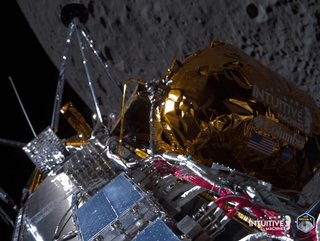Intuitive Machines: NASA's Odysseus bets on Private Company

NASA’s strategy to invest in small private companies to develop lunar services has paid off.
This week saw the ground-breaking moon landing by the Odysseus robot, the lunar lander developed by Intuitive Machines, as it touched down on the moon on 22nd February 2024 - the first US spacecraft since 1972. The company also became one of the first private companies to achieve a lunar landing, which has only been achieved by five countries so far.
A historic moment such as this highlights the continued connection between business and space exploration, as NASA continues partnering with companies to deliver innovative space-led results.
Intuitive Machines successfully transmitted its first IM-1 mission images to Earth on February 16, 2024. The images were captured shortly after separation from @SpaceX's second stage on Intuitive Machines’ first journey to the Moon under @NASA's CLPS initiative. pic.twitter.com/9LccL6q5tF
— Intuitive Machines (@Int_Machines) February 17, 2024
“Solving humanity’s greatest challenges”
Intuitive Machines uses data analytics to power space exploration. It is a US company founded in 2013 by Stephen Altemus, Kam Ghaffarian and Tim Crain.
The company has been working towards its lunar programme, consisting of lunar surface and orbit delivery, in addition to long-distance communications from the surface of the moon. It has been working closely with SpaceX to analyse test data for the IM-1 mission.
With NASA, it has been under contract to develop robotic spacecraft since 2020.
IM-1 flight, or Odysseus, has carried six NASA payloads that will focus on surface interactions, radio astronomy, precision landing technologies and a communication and navigation node for future autonomous navigation technologies.
Likewise, Intuitive Machines’ communications solution, Lunar Data Network (LDN) works to support near-space missions through its lunar operations centre, globally commissioned dish network and future relay satellites.
The network is a private and secure network that supports missions and is evolving to meet future market needs. Offered on a commercial scale, LDN supports data relay services for spacecraft in cislunar spaces and systems. It consists of Nova Control, global ground stations, base-band units installed at each ground station and lunar data relay satellites currently in production.
Data analytics vital to space exploration
NASA has been conducting the Commercial Lunar Payload Services Programme, which sees the space agency paying private companies to undertake scientific research, experiments and cargo to the moon.
This is the second commercial mission that NASA has funded this year, after Astrobotic launched a lander into space on a Vulcan rocket last month. However, for safety reasons, the robot had to return to Earth as one of its propulsion tanks ruptured and needed to be disposed of safely.
The goal of the Odysseus robot is to send images back to earth designed to assess the lunar environment of the moon’s south pole and plans to operate for seven days. This is ahead of NASA’s plan to send a crewed mission to the moon in 2026.
In addition, it carried scientific and artistic payloads under NASA’s Commercial Lunar Paylord Services (CLPS) initiative. NASA hopes that investing in smaller private companies will ultimately save the organisation costs and achieve better long-term results in space exploration.
Moving forward, it will be interesting to see how NASA continues to partner with private companies to benefit from data insights. The organisation is already working towards how AI and robotics will play vital roles in space-based construction, deployment and maintenance - and even utilising machine learning for new UFO research.
******
Make sure you check out the latest edition of AI Magazine and also sign up to our global conference series - Tech & AI LIVE 2024
******
AI Magazine is a BizClik brand






